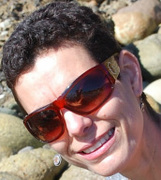May 23, 2019

Name: Orit Sivan
Title: Professor
Institution: Ben-Gurion University
Place of residence: Lehavim, Israel
Website: http://oritsivansgroup.weebly.com/
What kind of science do you do?
Environmental geochemistry. My group uses isotope geochemistry to learn about biogeochemical cycles and redox couplings of globally important species (as carbon, iron and sulfur) in natural aquatic systems. We focus on interfaces, such as the sediment-water and the fresh-saline groundwater in coastal aquifers. We combine field-work, laboratory experiments, chemical measurements, and reactive-transport models.
Why did you choose this field?
I wanted to explore processes in Earth in a direction that combines basic science and practical environmental aspects, and it led to a research that deals with environmental issues that are related to global climate change. This includes investigation of the natural consumption processes of the greenhouse gas methane in sediments, the effect of seawater intrusion into coastal aquifers on groundwater quality, and the potential use of saline groundwater for desalination. I love being outside in the field, which is actually beautiful lakes, ocean and beaches, and I like the diverse work that combines field, lab and models. I also really enjoy teaching and mentoring students.
What's the most interesting place you've ever done field work?
I have been working in the Dead sea, which is a unique, interesting hypersaline system. Its water level has been also (sadly) dramatically decreased over the last 50 years due to human activities, forming many sinkholes around it and complex hydrological conditions. I have started to work also recently in Alaska, which is exciting and highly important place to work on methane these days. Surprisingly, it actually reminds me of the Dead Sea area, where instead of sinkholes formed from salt dissolution there are lakes formed from permafrost thawing.
What are you working on now?
Most of the group works on methane related iron reduction processes in lakes, estuaries and marine sediments around the world (including involved redox couplings and authigenic minerals). We are working also on the potential use of saline groundwater in coastal aquifers for desalination, considering geochemical, hydrological and desalination aspects. In addition, we have been reconstructing the paleolimnological and paleohydrological conditions in the Dead Sea using porewater from sediments of ICDP deep cores.
Any advice for someone starting out in geochemistry?
Do whatever you like and find exciting. Be patient, don't get upset that it takes very long until you understand natural systems, and remember that the wish is to get the full big picture of the system.
If you could sit next to anyone on an airplane, who would it be?
David Grossman, my favorite author. His novels are beautiful, smart, and touching. I admire him also for his public involvement and being a peace activist. I would love to sit next to him and hear about his work and view of life.
What's your favorite city in the world and why?
My favorite city is defiantly Jerusalem, where I was born and raised. I feel that its natural beauty, long history, holy places, diverse population and even the tension create a unique deep spiritual atmosphere.
What is your favorite downtime activity?
Above all, I love to be with my family. I'm also a Jeweler, working with silver, gold and rough stones (which I find in many cases). I feel that this jewelry making fills exactly my desire to blend art and nature, and my work as geologist and chemist. In addition, I practice Yoga.